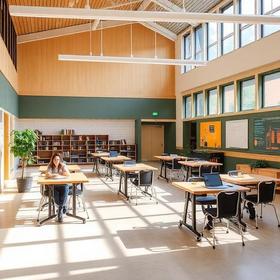Going to boarding school isn't an easy decision. You'll need to adjust to a new environment. The physical separation from your family and old friends can make the decision emotionally difficult. Financial costs are also a consideration. Is it worth it? Couldn't a private day school offer the same education and experience? Or a magnet school? Or a good public high school?
Things you should consider and compare:
Depending on where you live, local schooling options can compare to boarding schools in several ways. Nearby private day schools, magnet schools, or public high schools can naturally have very bright student bodies and qualified faculty. Academic and extracurricular offerings can also be equally challenging and diverse. If you're considering local options besides boarding school, compare these important considerations:
- Attention to students - boarding schools generally have small class sizes that help teachers engage every student in the classroom. Classroom settings are often specifically designed to encourage student participation and eye contact among everyone in class.
- Quality of faculty - most boarding school faculty have advanced degrees in their subject.
- Quality of resources - student resources at boarding schools, such as libraries, arts facilities, and athletic complexes, are often better than those at many colleges and universities.
- Challenging academics - academics at boarding schools operate at very high levels. Students are encouraged to question and discuss a wide array of subject matter in an environment where it is cool to learn.
- Broad and diverse offerings - the academics at boarding schools are diverse, with plenty of AP options. Some schools offer the International Baccalaureate Program. Athletic and extracurricular activities are part of the balanced approach to educating the whole child, a prominent feature of a boarding school education.
- College counseling - college counseling departments at boarding schools are generally well-staffed and taken quite seriously. Counselors have plenty of experience in helping applicants identify appropriate schools and advising them on admissions to competitive institutions.
Benefits unique to boarding school:
In other ways, however, you'll find that boarding schools are strictly unique. In your boarding school research, you'll likely hear that "boarding school is an education in and of itself." While a little corny, the phrase is true - living in a boarding school community leads to learning that is just as (or more) valuable than the education you get strictly in a classroom. Boarding school alumni say that they've really liked:
- Making choices that matter and taking responsibility for yourself - living alone isn't always easy. There is, of course, plenty of support from faculty, advisors, and peers. But still, you need to take care of yourself and take responsibility for your own actions to a much greater degree than if you were living at home. While there's definitely structure within the boarding school day, you still need to choose how you spend your time, what activities and opportunities to take, and how to create a reasonable balance between work and play. You'll be able to make choices that directly impact the things you learn and the life you lead at boarding school. For parents, this roughly translates to increased maturity, greater self-sufficiency, and superior preparation for college.
- Being in an environment where trying new things is encouraged - going to boarding school means venturing into something unfamiliar. Like any new adventure, going to boarding school means taking a risk because you think the reward will be worthwhile. The good news is that everyone else who goes to boarding school is also taking that risk. You'll be part of a community where the willingness to explore new things is inherent in the student body and where lots of people will also be trying new things. During boarding school, you'll repeatedly make ventures into the unknown. You'll meet new types of people, find your place in a new community, learn new skills and subjects, and challenge yourself to a higher academic standard. With every little challenge that boarding school presents, you learn more about yourself and become a little more comfortable with yourself. For parents: this means that students often experience much personal growth and increased self-confidence.
- Having a lot of fun and forming intense friendships - boarding school can also be a lot of fun. Imagine living in a house with a bunch of your best friends. It's common in boarding school for your dorm mates to become your closest friends and support network. The friendships that you make in this environment will be ones you will remember for life.
- Having a wide range of friends - boarding schools actively aim to recruit students from various geographic, racial, and socio-economic backgrounds. Many schools have students from all over the United States and dozens of countries. At boarding schools, you'll be exposed to a relatively wide range of individuals and cultures, whereas local options may expose you to a narrower background of students.
- Having faculty as friends and having them regularly available - students are exposed to faculty in plenty of settings throughout the day. They become familiar with their teachers guiding their education in the classroom, coaching them on the athletic fields, advising them in extracurricular activities, and supervising them in dorm settings. Since faculty are accessible throughout the day, getting academic help is usually much easier. Also, relationships with faculty members and adults can better thrive in these multiple settings, creating learning and mentorship opportunities that are hard to find in other environments.
- Being part of a proud community - boarding school alumni are generally very enthusiastic and proud of their boarding school alma maters (in many cases, more so than their college alma maters). The traditions and history behind many boarding schools drive the character of each school and influence each student who goes there. The shared experience of this tradition and history creates a strong network of people and a feeling of community that lasts for life.
Education takes on a broad meaning at boarding schools. Boarding schools recognize this - they often have an explicit mission to educate students in the classroom and help them become better-rounded individuals. So, while boarding schools often do very well at educating students academically (in ways that may be better than local schooling options), their less directly measurable benefits should also be considered. Keep this in mind as you research schooling options. You may also want to read about common boarding school myths if your perception of boarding school is driven largely by popular movies and urban legends.
Questions? Contact us on Facebook and Instagram. @boardingschoolreview
#BoardingSchoolLife #PersonalDevelopment #AcademicChallenge #GlobalFriendships #IndependentLiving














